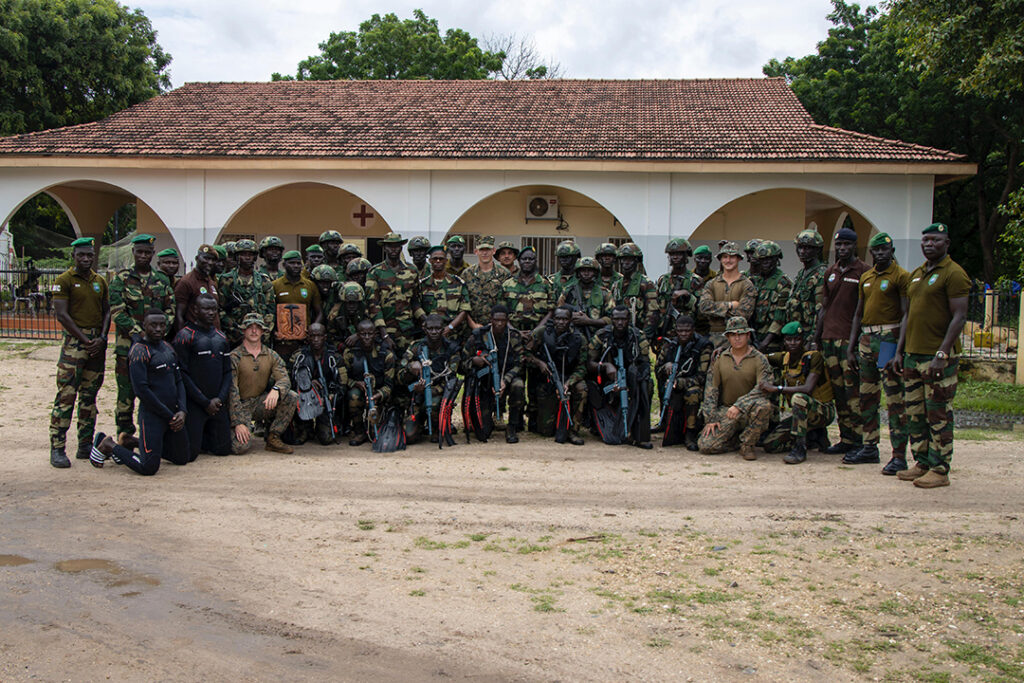ADF STAFF
The Saloum River delta in Senegal is a vast region of sun-drenched salt marshes, brackish estuaries and hundreds of islands.
Bursting with wildlife and thick, green mangrove forests, it could provide the perfect cover for the kind of smugglers and militant groups that the Armed Forces of Senegal are training to deter.
It’s where members of the Senegalese Compagnie Fusilier de Marin Commando (COFUMACO) recently took part in a six-week Riverine and Jungle Warfare Course with their partners, the United States Marines.
“This training is very interesting for us,” 1st Lt. Oumar Ndiaye, one of the COFUMACO’s program coordinators, told ADF. “My guys and I learned a lot. It was generally very useful information.”
The Senegalese commandos sharpened their skills and tactics on land and in the waters surrounding Tactical Training Center No. 3, near the riverbank of the small town of Toubacouta.
The course began in classrooms in August and culminated with a final amphibious exercise and a closing formation on September 27 to acknowledge the accomplishment.
Ndiaye said the Marines assisted the Senegalese trainers and quickly made a strong impression while teaching about operational planning by making a small-scale map with a grid on a sand table.
“That was new for us,” he said. “Also, the MEDEVAC [medical evacuation] while under fire, and how to withdraw from the fire and save the injured. We also learned how to ambush.
“My guys learned a lot from the grit and aggression the Marines brought. We also were able to share some common military and cultural things, so I think that was very valuable for us.”
The Marine Corps and the COFUMACO have a nearly two-decade relationship focused on enhancing their military capabilities.
U.S. Marines Staff Sgt. Anthony Gomez, a tactical training team platoon sergeant with the USS Hershel “Woody” Williams Marine detachment, said it is a two-way partnership.
“The Senegalese COFUMACO have a lot of heart and drive, which led to great unit cohesion,” he told ADF. “We got to see how they conducted land and amphibious operations, and they got to see how we would conduct those same operations.
“We were able to push and pull information, which enabled us to expand our knowledge in both militaries.”
Participants learned how to plan and conduct amphibious and land operations, including urbanized terrain tactics and close-quarters battle formations. There were multiple live-fire drills on ranges.
Amphibious training included boat operations — visit, board, search and seizure training — swimming in the river with fins and gear, and practice raids. Participants went through a water obstacle course and an endurance course through water and mangroves. They also did survival training on one of the small islands.
The COFUMACO, which operates in Senegal’s riverine environments, is training to bolster maritime security and stability in coastal West Africa. The region, however, is a prime target for extremist militant groups, some tied to al-Qaida and the Islamic State group.
Senegal has not suffered any recent attacks, but it shares a border with Mali, where several militant groups operate.
That’s why the Riverine and Jungle Warfare course was so important, according to one COFUMACO participant, Staff Sgt. Kary Marone, who said the difficulty of the training was matched by its value.
“They trained us physically,” he told ADF. “It was very hard, but it helped us a lot. No matter how hard our future operations are, we will be able to support them.”

